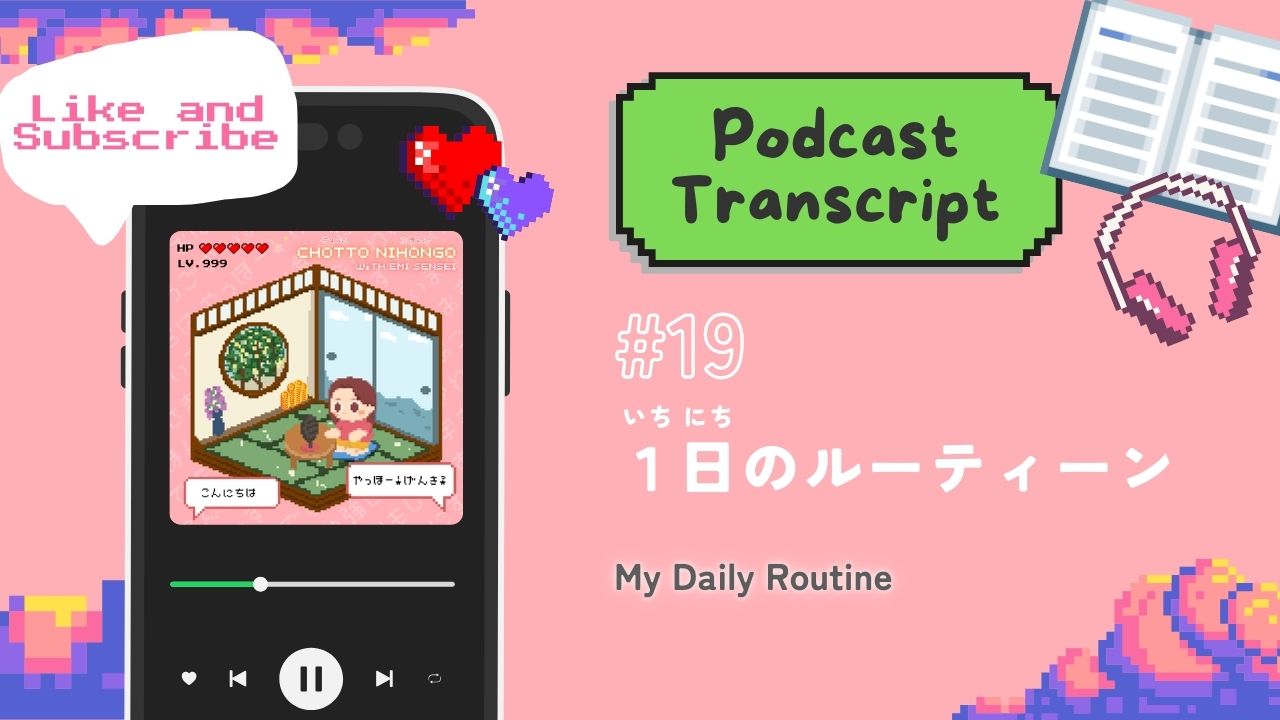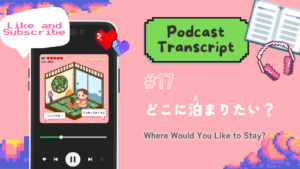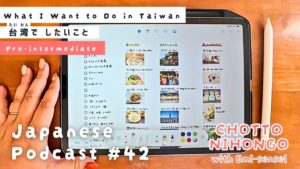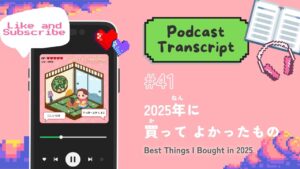おすすめの Google 拡張機能です!新しい言葉を勉強しましょう!
Here are the recommended Chrome extensions! Let’s learn new words here!
ポッドキャストプラットフォーム|Platforms of Podcast
こちらの記事は、配信中のポッドキャストのスクリプトです。
ぜひ、ポッドキャストを聞きながら読んでください。
 えみ先生
えみ先生もう聞いた人は、クイズをチェックしましょう!
ちょっとクイズ!|CHOTTO Quiz!
ポッドキャストを聞いた人は、ちょっとクイズを解いてみましょう。
むずかしいときは、下のスクリプトを読んで、もう一度クイズをチェックしてみてください。
【えいご】English Translation
Answer these quiz questions if you’ve listened to a new episode of my podcast.
If it was difficult, read the transcript below and try again.
❓ えみ先生は、ゴールデンウィークにどこに行きますか?|Where is Emi-sensei going for Golden Week?
沖縄から来る家族と大阪万博に行って、そのあと鳥取、福井、岐阜に行って、最後に神奈川に帰ります。
Emi-sensei will go to the Osaka Expo with her family from Okinawa, then to Tottori, Fukui, Gifu, and finally return to Kanagawa.
❓ えみ先生は朝、何をよく食べますか?|What does Emi-sensei often eat for breakfast?
ヨーグルトや、ご飯と納豆を食べます。
Emi-sensei eats yogurt or rice with natto.
❓ えみ先生の仕事は、何時までに終わりますか?|By what time does Emi-sensei usually finish working?
だいたい8時くらいまでに終わります。
Emi-sensei usually finishes working by around 8 p.m.
ポッドキャストのスクリプト|Transcript of Podcast
エピソード19、「1日のルーティーン」
このポッドキャストは、初中級(Pre-Intermediate)レベルです。
おはようございます。こんにちは。こんばんは。
日本語の先生、エミです。
先週はポッドキャストをお休みしました。
すみません、ちょっと いそがしかったです。
でも、今週から日本はゴールデンウィークです。
ゴールデンウィークは、4月の終わりから5月の初めまでの長い休みのことです。
学校や ほとんどの会社が休みになります。
【えいご】English Translation
Good morning. Hello. Good afternoon.
I am a Japanese teacher, Emi.
I didn’t upload a podcast last week.
Sorry, I was a bit busy.
But starting this week, it’s (a holiday called) Golden Week in Japan.
Golden Week is a long holiday from the end of April to the beginning of May.
Schools and most companies have some days off.
私は、ゴールデンウィークにいろいろなところに行く予定です。
沖縄の家族が大阪に来るので、大阪万博(Expo)に行ってきます。
そして、そのあと鳥取に行って、福井に行って、岐阜に行って、最後に神奈川に帰ってきます。
みなさんは、週末は予定がありますか?
ぜひ教えてください。
【えいご】English Translation
I have plans to go to various places during Golden Week.
My family from Okinawa is coming to Osaka, so we’ll go to the Osaka Expo.
After that, I (and my husband) will go to Tottori, then Fukui, then Gifu, and finally we’ll return to Kanagawa.
Do you have any plans for the weekend?
Please let me know.
ここで先週の質問をチェックしましょう。
先週は こんな質問をしました。
「みなさんの1日のルーティーンは何ですか?
朝起きてから夜寝るまで、いつもどんなことをしますか?」
こんな質問でした。
みなさんは、毎日どんなふうに過ごしていますか?
今日は 私の1日を紹介します。
【えいご】English Translation
Alright, now let’s check last week’s question.
Last week, I asked this question:
“What’s your daily routine?
What do you usually do from the time you wake up in the morning until you go to bed at night?“
That was the question.
How do you spend your day every day?
Today, I’ll introduce my daily routine.
まず、朝です。
私は、だいたい いつも7時頃に起きます。
でも、たまにたくさん寝たくて寝坊します。ときどき7時半ぐらいに起きます。
起きてから歯を磨いて、顔を洗って、髪をとかします。
そして、朝ごはんを食べます。
ヨーグルトを食べたり、ご飯と納豆を食べたりします。
【えいご】English Translation
First, the morning.
I usually wake up around 7 o’clock.
But sometimes I want to sleep a lot and oversleep.
Occasionally I wake up around 7:30.
After waking up, I brush my teeth, wash my face, and comb my hair.
Then I eat breakfast.
I eat things like yogurt, or rice and natto.
朝ごはんの後、飲み物を準備して、レッスンの準備をします。
私は、朝にレッスンが多いです。
朝8時からレッスンをしていて、おおい時は 8時から1時ぐらいまで 連続でレッスンをしています。
5つぐらいレッスンをしますね。
朝から5つレッスンがある時は、ちょっと大変です。
トイレもしたくなるし、「次は誰のレッスンだっけ?」とわからなくなる時もあります。
【えいご】English Translation
After breakfast, I prepare a drink and get ready for lessons.
I often have lessons in the morning.
I teach from 8 a.m., and on busy days, I have lessons continuously from 8 a.m. until around 1 p.m.
I do about five lessons.
When I have five lessons in the morning, it’s a bit tough.
I need to go to the bathroom, and sometimes I forget, “Whose lesson is next?”
でも、ゆっくりなスケジュールのときは、朝に1つか 2つレッスンをして、そのあとフィードバックシートを書いています。
朝のレッスンが終わったら、1時くらいにお昼ご飯を食べます。
私は家で仕事をしているので、お昼ご飯は家で食べます。
自分でご飯を作ったり、前の日の夕ご飯の残り(Leftover)を食べたりします。
昼ご飯のあと、レッスンがない時は、外を散歩して、カフェに行くこともあります。
【えいご】English Translation
But when my schedule is slow, I do one or two lessons in the morning, and after that I write feedback sheets.
When the morning lessons are over, I eat lunch around 1 p.m.
I work from home, so I eat lunch at home.
I cook by myself or eat leftovers from the night before.
After lunch, when I don’t have lessons, I sometimes take a walk outside and go to a café.
仕事はだいたい8時くらいまでには終わります。
それからジムに行ったり、夕ご飯を作ったりします。
夜は YouTubeを見たり、次の日のレッスンの準備をしたりします。
そして11時頃に寝ます。
これはレッスンがある日、平日のルーティーンです。
【えいご】English Translation
I usually finish work by around 8 p.m.
After that, I go to the gym or cook dinner.
At night, I watch YouTube or prepare for the next day’s lessons.
Then I go to bed around 11 o’clock.
This is my weekday routine when I have lessons.
土曜日と日曜日は、ちょっとちがいます。
朝は8時ぐらいまで寝ます。
そして、スーパーに行ったり、カフェに行って勉強したりします。
みなさんの1日はどんな感じですか?
何か違うところはありますか?
今日は、私の一日のルーティーンについて話しました。
みなさんのルーティーンも教えてください。
【えいご】English Translation
Saturdays and Sundays are a little different.
I sleep until around 8 a.m.
Then I go to the supermarket or go to a café and study.
What is your daily routine like?
Is there anything different?
Today, I talked about my daily routine.
Please tell me about your routine too.
では、今日も みなさんに 質問があります。
「みなさんは、朝ごはんはパン派ですか?
ご飯派ですか?
朝ごはんによく食べるものありますか?」
好きなものを話す時に、「〜(なになに)派」という言葉を使います。
パンよりご飯が好きな人は「ご飯派」、犬より猫が好きな人は「猫派」です。
私は、朝ごはんによく食べるものがあります。
それを来週話したいと思います。
【えいご】English Translation
Now, I have a question for you today as always.
“Are you a bread person or a rice person for breakfast?
Is there something you often eat for breakfast?”
When talking about preferences, we use the word “~ha” (派 = group/type).
People who like rice more than bread are “gohan-ha” (rice group),
People who like cats more than dogs are “neko-ha” (cat group).
I have something I often eat for breakfast.
I want to talk about that next week.
今日のポッドキャストのスクリプトは、私のウェブサイトにあります。
ウェブサイトは、 en-nihongo.com です。
よかったら、ポッドキャストの感想や、質問の答えをコメントで教えてください!
じゃあ、また来週のポッドキャストで会いましょう。
じゃあね~!
【えいご】English Translation
A transcript for today’s podcast is on my website.
The website is en-nihongo.com .
I’d be very happy if you could share your thoughts/impressions or could answer the question I asked in this episode!
I’ll see you in the next episode.
Jaa ne-!







コメント|Comment